一般过去时,过去进行时和过去完成时
一般过去时、过去进行时、过去完成时(课堂PPT)

3
常用时间 常与一般过去时态连用的时间有:
yesterday yesterday morning (afternoon, evening…) last night (week, month, year…) two days ago, a week ago, three years ago… in 1990, (in 1998…)
C. has just stared D. had just stared 18
5.I first met Lisa three years ago. She ___ at a radio shop at the time.
A. has worked
B. was working
C. had been working D. had worked
指当时一时的表现12一般过去时与过去进行时的区别1一般过时往往表示某一动作已经完成而过去进行时却表示动作在持续或未完成
一般过去时
1
一般过去时
知识结构
构成 用法 常用时间
动词的过去式
1、表示过去某个时 间发生的动作或 存在的状态。
2、表示过去经常或 反复发生的动作。
yesterday
last night
in 1990
two days ago
2
用法 1、表示过去某个时间发生的动作或存在的状态。
He was here yesterday. I got up at six thirty yesterday morning. My father was at work yesterday afternoon. Did you have a good time last summer?
初中英语时态8种基本时态讲解
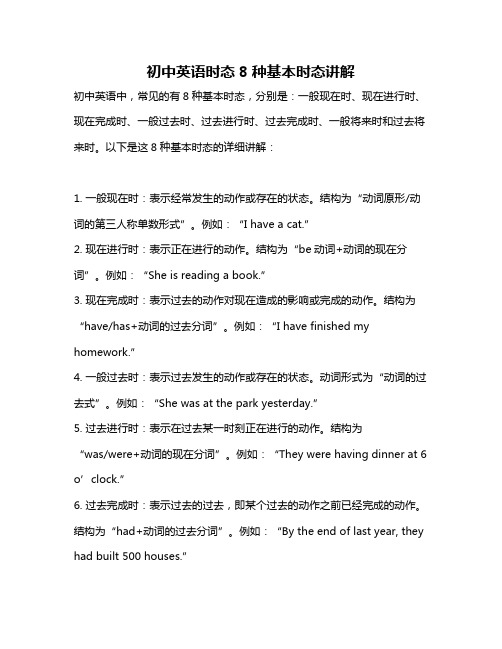
初中英语时态8种基本时态讲解初中英语中,常见的有8种基本时态,分别是:一般现在时、现在进行时、现在完成时、一般过去时、过去进行时、过去完成时、一般将来时和过去将来时。
以下是这8种基本时态的详细讲解:1. 一般现在时:表示经常发生的动作或存在的状态。
结构为“动词原形/动词的第三人称单数形式”。
例如:“I have a cat.”2. 现在进行时:表示正在进行的动作。
结构为“be动词+动词的现在分词”。
例如:“She is reading a book.”3. 现在完成时:表示过去的动作对现在造成的影响或完成的动作。
结构为“have/has+动词的过去分词”。
例如:“I have finished my homework.”4. 一般过去时:表示过去发生的动作或存在的状态。
动词形式为“动词的过去式”。
例如:“She was at the park yesterday.”5. 过去进行时:表示在过去某一时刻正在进行的动作。
结构为“was/were+动词的现在分词”。
例如:“They were having dinner at 6 o’clock.”6. 过去完成时:表示过去的过去,即某个过去的动作之前已经完成的动作。
结构为“had+动词的过去分词”。
例如:“By the end of last year, they had built 500 houses.”7. 一般将来时:表示将来要发生的动作或存在的状态。
结构为“will+动词原形”或“am/is/are going to+动词原形”。
例如:“We will visit the museum next week.”8. 过去将来时:表示从过去的某一时刻看,将来要发生的动作或存在的状态。
结构为“would+动词原形”或“was/were going to+动词原形”。
例如:“He said he would come back soon.”以上就是初中英语8种基本时态的讲解,希望对你有帮助!。
初中英语八大时态知识点详解 4
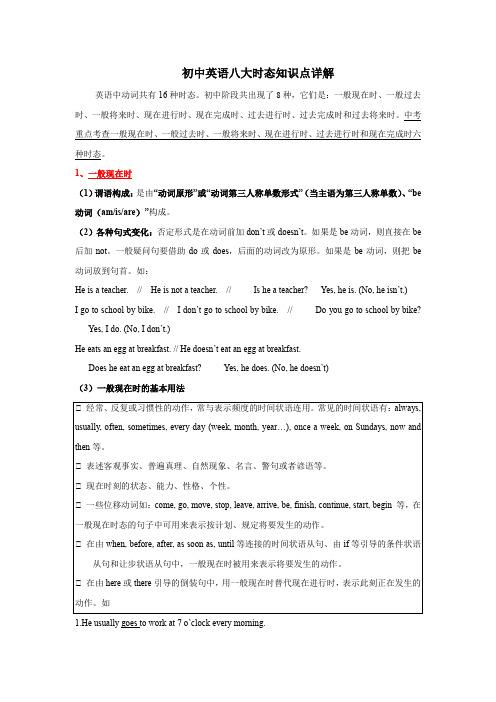
初中英语八大时态知识点详解英语中动词共有16种时态。
初中阶段共出现了8种,它们是:一般现在时、一般过去时、一般将来时、现在进行时、现在完成时、过去进行时、过去完成时和过去将来时。
中考重点考查一般现在时、一般过去时、一般将来时、现在进行时、过去进行时和现在完成时六种时态。
1、一般现在时(1)谓语构成:是由“动词原形”或“动词第三人称单数形式”(当主语为第三人称单数)、“be 动词(am/is/are)”构成。
(2)各种句式变化:否定形式是在动词前加don’t或doesn’t。
如果是be动词,则直接在be 后加not。
一般疑问句要借助do或does,后面的动词改为原形。
如果是be动词,则把be 动词放到句首。
如:He is a teacher. // He is not a teacher. // ---- Is he a teacher? --- Yes, he is. (No, he isn’t.)I go to school by bike. // I don’t go to school by bike. // ---- Do you go to school by bike? ---- Yes, I do. (No, I don’t.)He eats an egg at breakfast. // He doesn’t eat an egg at breakfast.---- Does he eat an egg at breakfast? ---- Yes, he does. (No, he doesn’t)(3)一般现在时的基本用法1.He usually goes to work at 7 o’clock every morning.2.Every dog has its day. 凡人皆有得意日。
3.Pride goes before a fall. 骄者必败。
4.The earth goes around the sun. 地球绕着太阳转。
一般过去时过去完成时和过去进行时的区别
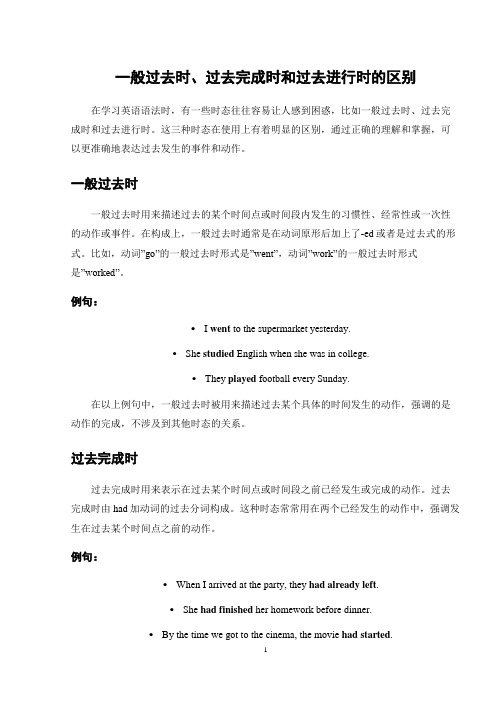
一般过去时、过去完成时和过去进行时的区别在学习英语语法时,有一些时态往往容易让人感到困惑,比如一般过去时、过去完成时和过去进行时。
这三种时态在使用上有着明显的区别,通过正确的理解和掌握,可以更准确地表达过去发生的事件和动作。
一般过去时一般过去时用来描述过去的某个时间点或时间段内发生的习惯性、经常性或一次性的动作或事件。
在构成上,一般过去时通常是在动词原形后加上了-ed或者是过去式的形式。
比如,动词”go”的一般过去时形式是”went”,动词”work”的一般过去时形式是”worked”。
例句:•I went to the supermarket yesterday.•She studied English when she was in college.•They played football every Sunday.在以上例句中,一般过去时被用来描述过去某个具体的时间发生的动作,强调的是动作的完成,不涉及到其他时态的关系。
过去完成时过去完成时用来表示在过去某个时间点或时间段之前已经发生或完成的动作。
过去完成时由had加动词的过去分词构成。
这种时态常常用在两个已经发生的动作中,强调发生在过去某个时间点之前的动作。
例句:•When I arrived at the party, they had already left.•She had finished her homework before dinner.•By the time we got to the cinema, the movie had started.在以上例句中,过去完成时指明了在过去某个时间点之前已经完成的动作,通过这种时态可以清晰地表达出事件之间的先后顺序。
过去进行时过去进行时用来描述在过去某个具体时间或时间段内正在进行的动作。
过去进行时由was/were加动词的ing形式构成。
这种时态强调了动作或事件发生时正在进行的状态。
一般过去时、过去进行时及过去完成时重难点

一般过去时、过去进行时及过去完成时重难点一、一般过去时一般过去时主要表示在过去某一时刻发生的动作或存在的状态。
在条件、时间、让步等状语从句中,常用一般过去时表示过去进行的动作。
一般过去时由动词的过去式构成。
如:She told me she wouldn?蒺t leave until you came back.重点提示:要注意一般过去时和现在完成时的区别。
现在完成时表示某一动作对现在造成的影响或结果,强调的是现在的情况,因此不能与表示过去的时间状语连用。
一般过去时只表示过去发生过某事,常与表示过去的时间状语连用。
试比较:He has lost the key. (现在没有了)He lost the key. (现在可能找到了,也可能没找到)二、过去进行时过去进行时的构成是“was / were + V-ing形式”。
过去进行时主要用于:1. 表示过去某个时刻正在进行的动作。
2. 表示过去某个阶段正在进行的动作。
3. 一些表示位置移动的动词,如come, go, leave, stay, start, take, arrive, move, close等也可以用过去进行时表示过去将来的动作。
如:The naughty boy was making trouble all the time.三、过去完成时过去完成时是一种相对概念,是相对于过去某一时间或动作而言的。
因此一定要在形式或意义上有明显的过去时间或动作作为参照标志。
主要表示在过去某一时间或动作之前已经完成的动作或存在的状态,即动作或状态发生在“过去的过去”。
常用于下列情形:⑴主语+ 过去完成时+ before 从句(从句用一般过去时)⑵主语+ 过去完成时+ by 从句(从句用一般过去时)⑶主语+ 过去完成时+ when 从句(从句用一般过去时)⑷主语+ told (said, knew, heard, thought...) + 宾语从句(从句用过去完成时)。
初中英语时态8种基本时态归纳
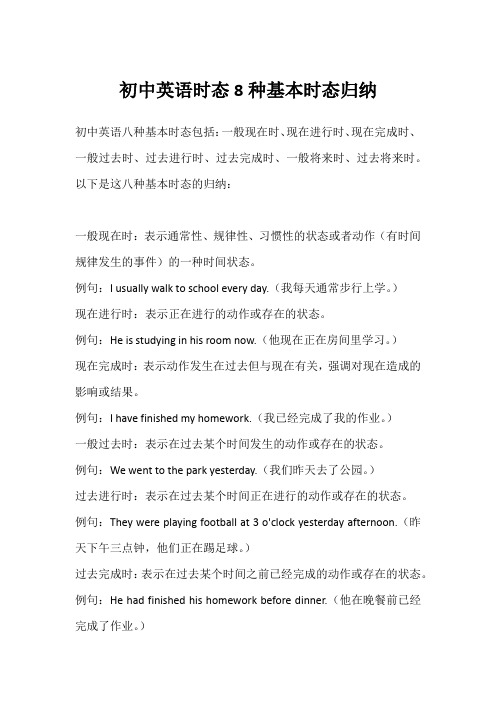
初中英语时态8种基本时态归纳初中英语八种基本时态包括:一般现在时、现在进行时、现在完成时、一般过去时、过去进行时、过去完成时、一般将来时、过去将来时。
以下是这八种基本时态的归纳:一般现在时:表示通常性、规律性、习惯性的状态或者动作(有时间规律发生的事件)的一种时间状态。
例句:I usually walk to school every day.(我每天通常步行上学。
)现在进行时:表示正在进行的动作或存在的状态。
例句:He is studying in his room now.(他现在正在房间里学习。
)现在完成时:表示动作发生在过去但与现在有关,强调对现在造成的影响或结果。
例句:I have finished my homework.(我已经完成了我的作业。
)一般过去时:表示在过去某个时间发生的动作或存在的状态。
例句:We went to the park yesterday.(我们昨天去了公园。
)过去进行时:表示在过去某个时间正在进行的动作或存在的状态。
例句:They were playing football at 3 o'clock yesterday afternoon.(昨天下午三点钟,他们正在踢足球。
)过去完成时:表示在过去某个时间之前已经完成的动作或存在的状态。
例句:He had finished his homework before dinner.(他在晚餐前已经完成了作业。
)一般将来时:表示将来的动作或状态,通常与“will”或“shall”连用。
例句:It will rain tomorrow.(明天会下雨。
)过去将来时:表示在过去某个时间之后将要发生的动作或存在的状态,通常与“would”连用。
例句:He said he would come to see me the next day.(他说他第二天会来看我。
)。
七个时态:一般现在时、现在进行时、将来时:begoingto(=will)、一般过去时、过去进行时、过去完成时、现在

主要要一下七个时态:一般现在时、现在进行时、将来时:be goingto(= will )、一般过去时、过去进行时、过去完成时、现在完成进行时。
(1)一般现在时1.一般现在时表示经常或习惯性的动作,也可表示现在的状态或主语具备的性格和能力。
2.一般现在时中,没有be动词和情态动词,主语为第三人称单数的肯定句,动词要按规则加上s,主语是非第三人称单数的肯定句,动词用原形。
3.在一般现在时中,句中有be动词或情态动词时,否定句在be 动词和情态动词后加not,一般疑问句将be动词或情态动词放在句4.在一般现在时中,句中没有be动词或情态动词时,主语为第三人称单数的否定句在动词前加does+not (doesn’t),一般疑问句在句首加does,句子中原有动词用原形;主语为非第三人称单数,否定句用do+not (don’t),一般疑问句在句首加do,句子中动词用原形。
5.动词+s的变化规则1)一般情况下,直接加-s,如:cook-cooks, milk-milks2)以s. x. sh. ch. o结尾,加-es,如:guess-guesses,wash-washes,watch-watches, go-goes3)以“辅音字母+y”结尾,变y为i, 再加-es,如:study-studies6. 句中be动词和动词一般情况下只能有一种而且也必须有一种。
如:The childrenare very happy on Christmas Day .7.一般现在时中的be动词:一般用原形:am is aream用于第一人称单数(I);is用于第三人称单数(he she it和其他人名或称谓,如:Ben his sister等);are用于第二人称单数(you)和所有复数(包括第一人称复数we、第二人称复数you;第三人称复数they和其他复数,如his parents等)。
8.一般过去时中的动词:有两种情况:第一种情况:主语是第三人称单数(he she it 和其他,如Helen 、her cousin 等),动词后一般加s或es。
英语八大时态总结表时态结构与用法

英语八大时态总结表时态结构与用法八大时态是指一般现在时、一般过去时、一般将来时、现在进行时、过去进行时、过去完成时、现在完成时和过去将来时。
英语时态分为16种:一般现在、一般过去、一般将来、过去将来时,以及这四者的进行时、完成时和完成进行时下面就英语中常见的八种基本时态进行阐述,其它的时态都是在这八种时态的基础上结合而成的。
一、一般现在时:1.概念:经常、反复发生的动作或行为及现在的某种状况。
2.时间状语: always, usually, often, sometimes, every week day, year, month…, once a week, on Sundays,3.基本结构:动词原形(如主语为第三人称单数,动词上要改为第三人称单数形式)4.否定形式:am/is/are+not;此时态的谓语动词若为行为动词,则在其前加don't,如主语为第三人称单数,则用doesn't,同时还原行为动词。
5.一般疑问句:把be动词放于句首;用助动词do提问,如主语为第三人称单数,则用does,同时,还原行为动词。
6.例句:. It seldom snows here.He is always ready to help others.Action speaks louder than words.二、一般过去时:1.概念:过去某个时间里发生的动作或状态;过去习惯性、经常性的动作、行为。
2.时间状语:ago, yesterday, the day before yesterday, last week,lastyear, night, month…, in 1989, just now, at the age of 5, one day, long long ago, once upon a time, etc.3.基本结构:be动词;行为动词的过去式4.否定形式:was/were+not;在行为动词前加didn't,同时还原行为动词。
初中英语时态8种基本时态
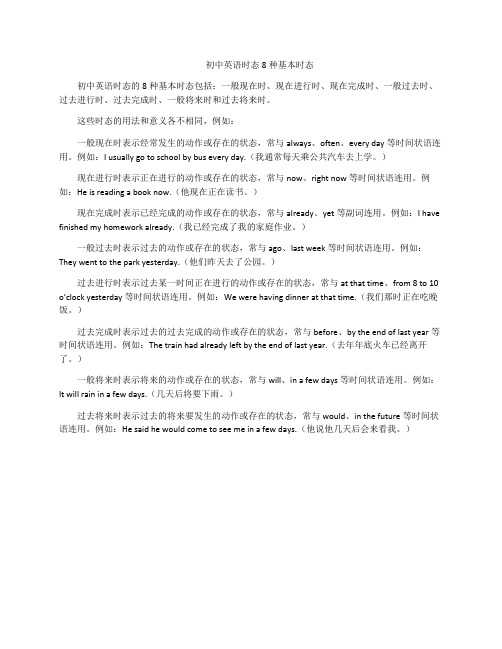
初中英语时态8种基本时态初中英语时态的8种基本时态包括:一般现在时、现在进行时、现在完成时、一般过去时、过去进行时、过去完成时、一般将来时和过去将来时。
这些时态的用法和意义各不相同,例如:一般现在时表示经常发生的动作或存在的状态,常与always、often、every day等时间状语连用。
例如:I usually go to school by bus every day.(我通常每天乘公共汽车去上学。
)现在进行时表示正在进行的动作或存在的状态,常与now、right now等时间状语连用。
例如:He is reading a book now.(他现在正在读书。
)现在完成时表示已经完成的动作或存在的状态,常与already、yet等副词连用。
例如:I have finished my homework already.(我已经完成了我的家庭作业。
)一般过去时表示过去的动作或存在的状态,常与ago、last week等时间状语连用。
例如:They went to the park yesterday.(他们昨天去了公园。
)过去进行时表示过去某一时间正在进行的动作或存在的状态,常与at that time、from 8 to 10 o’clock yesterday等时间状语连用。
例如:We were having dinner at that time.(我们那时正在吃晚饭。
)过去完成时表示过去的过去完成的动作或存在的状态,常与before、by the end of last year等时间状语连用。
例如:The train had already left by the end of last year.(去年年底火车已经离开了。
)一般将来时表示将来的动作或存在的状态,常与will、in a few days等时间状语连用。
例如:It will rain in a few days.(几天后将要下雨。
英语16种时态表格总结
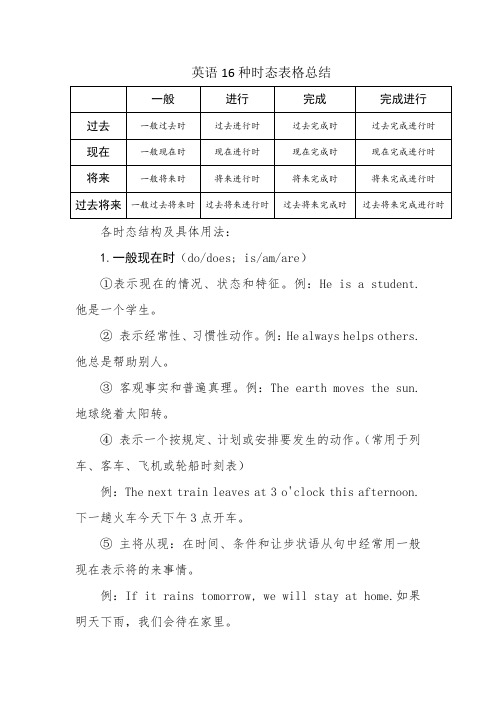
英语16种时态表格总结各时态结构及具体用法:1.一般现在时(do/does; is/am/are)①表示现在的情况、状态和特征。
例:He is a student.他是一个学生。
②表示经常性、习惯性动作。
例:He always helps others.他总是帮助别人。
③客观事实和普遍真理。
例:The earth moves the sun.地球绕着太阳转。
④表示一个按规定、计划或安排要发生的动作。
(常用于列车、客车、飞机或轮船时刻表)例:The next train leaves at 3 o'clock this afternoon.下一趟火车今天下午3点开车。
⑤主将从现:在时间、条件和让步状语从句中经常用一般现在表示将的来事情。
例:If it rains tomorrow, we will stay at home.如果明天下雨,我们会待在家里。
2.现在进行时(am/is/are doing)①表示此时此刻正在发生的事情。
例:He is listning to the music now.他现在正在听音乐。
②表示目前一段时间内一直在做的事情,但不一定此时此刻正在做。
例:I am studying computer this term.这个学期我一直在学习计算机。
③现在进行时可以表示将来的含义。
瞬时动词的进行一定表将来。
例:I am leaving.我要离开了。
持续动词的进行只有有将来的时间状语或有将来语境中才表将来。
例:I am travelling next month.下个月我要去旅行。
④现在进行时与频度副词连用,表示说话者或褒义或贬义的感情色彩。
例:He is always helping others.他总是帮助别人。
(褒义)3.过去进行时(was/ were doing)①表示在过去一个具体的时间正在发生的动作。
例:Mary was listening to light music 10 minutes ago.10分钟前,玛丽正在听轻音乐。
一般过去时与过去进行时的区别和过去完成时与过去完成进行时的区别

一般过去时与过去进行时的区别和过去完成时与过去完成进行时的区别一般过去时和过去进行时的比较一般过去时和过去进行时虽然同是指过去发生的动作或存在的状态,但是,他们还是有很大的质的区别,那就是他们所指的时间有很大的不同。
一般过去时所指的过去时间却比较笼统,而过去进行时所指的过去时间则比较具体。
试比较下面两组句子:A组She joined the League three years ago.The story took place in 1985.Aunt read me a story last night.B组Mary was cooking at this time yesterday.She was doing some washing when I come in.I was sleeping when the thief broke into the house.A组中的three years ago、in 1985、last night 所指的过去时间均较为笼统,因此必须采用一般过去时。
而B组中的at this time yesterday、when I came in、when the thief broke into the house 所指的过去时间均较为具体,因此必须采用过去进行时。
一般过去时和过去进行时,除了他们所指的时间有差别之外,还可以通过他们动作的性质来加以区别。
一般过去时表示在过去某个时间发生的动作或存在的状态,也表示过去经常或反复发生的动作。
它强调的是动作的“发生”或状态的“存在”。
过去进行时表示在过去某一时刻或在过去某一段时间内正在进行的动作。
它强调的是动作的“正在进行”。
试比较下面两组句子:C组Did he watch TV last night?I got up at five yesterday.I studied in that class last year.D组Mum was doing some washing yesterday evening.We were cleaning the classroom this time yesterday.The teacher was talking to some parents when I saw her.C组中的“看电视”、“起床”、“学习”都是属于过去某一时候动作的“发生”或状态的“存在”,所以必须采用一般过去时。
英语八大时态例句及解析
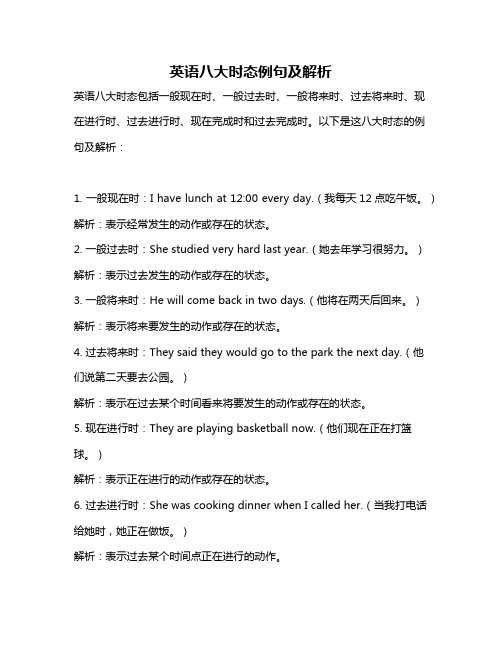
英语八大时态例句及解析英语八大时态包括一般现在时、一般过去时、一般将来时、过去将来时、现在进行时、过去进行时、现在完成时和过去完成时。
以下是这八大时态的例句及解析:1. 一般现在时:I have lunch at 12:00 every day.(我每天12点吃午饭。
)解析:表示经常发生的动作或存在的状态。
2. 一般过去时:She studied very hard last year.(她去年学习很努力。
)解析:表示过去发生的动作或存在的状态。
3. 一般将来时:He will come back in two days.(他将在两天后回来。
)解析:表示将来要发生的动作或存在的状态。
4. 过去将来时:They said they would go to the park the next day.(他们说第二天要去公园。
)解析:表示在过去某个时间看来将要发生的动作或存在的状态。
5. 现在进行时:They are playing basketball now.(他们现在正在打篮球。
)解析:表示正在进行的动作或存在的状态。
6. 过去进行时:She was cooking dinner when I called her.(当我打电话给她时,她正在做饭。
)解析:表示过去某个时间点正在进行的动作。
7. 现在完成时:I have finished my homework.(我已经完成了作业。
)解析:表示已经完成的动作或存在的状态,强调对现在的影响。
8. 过去完成时:They had left before we arrived.(在我们到达之前,他们已经离开了。
)解析:表示在过去的某个时间之前已经完成的动作。
希望能够帮助到您。
如需更多详细信息,建议查阅英语语法书籍或咨询英语教师。
一般过去时,过去进行时和过去完成时.

一般过去时,过去进行时和过去完成时.一般过去时、过去进行时和过去完成时语法专题突破品味语法1.I got up early,washed my face,had a quick breakfast and hurried to school. 2.He was watching TV at home from 3∶00 to 5∶00 yesterday afternoon.3.He had just finished sweeping the classroom when the teacher returned from the office自我探究这三句都使用了过去的时态。
第1句是一般过去时,表示“发生在过去的”动作;第2句是过去进行时,表示“在过去某一时刻或某段时间正在发生的动作”;第3句是过去完成时,表示在“过去某一时间之前已经完成的动作”。
讲解归纳一、一般过去时 1.表示在确定的过去时间内发生的动作或状态。
Did you watch the football match broadcast on TV yesterday evening?你昨晚观看电视转播的足球赛了吗?2.表示过去经常发生的动作或习惯性动作。
I always got up too late,and never had enough time for breakfast.我总是起床很晚,从来没有足够的时间吃早饭。
【温馨提示】这种情况也可用used to 和would 表示。
3.描述几个相继发生的过去动作。
The students got up early in the morning,did morning exercises and then read English aloud in the open air.学生们起床很早,做早操,然后在室外朗读英语。
4.有时动词的一般过去时形式上为过去,而实际上却指现在,即“原来想的”与现在的实际情况不相符。
七个时态
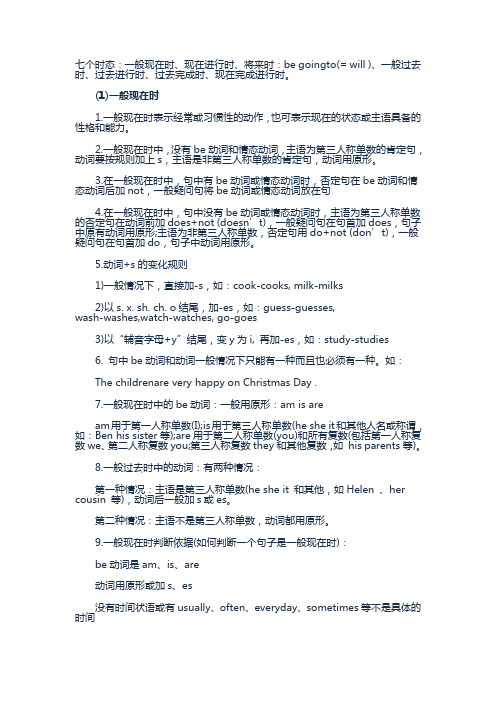
七个时态:一般现在时、现在进行时、将来时:be goingto(= will )、一般过去时、过去进行时、过去完成时、现在完成进行时。
(1)一般现在时1.一般现在时表示经常或习惯性的动作,也可表示现在的状态或主语具备的性格和能力。
2.一般现在时中,没有be动词和情态动词,主语为第三人称单数的肯定句,动词要按规则加上s,主语是非第三人称单数的肯定句,动词用原形。
3.在一般现在时中,句中有be动词或情态动词时,否定句在be动词和情态动词后加not,一般疑问句将be动词或情态动词放在句4.在一般现在时中,句中没有be动词或情态动词时,主语为第三人称单数的否定句在动词前加does+not (doesn’t),一般疑问句在句首加does,句子中原有动词用原形;主语为非第三人称单数,否定句用do+not (don’t),一般疑问句在句首加do,句子中动词用原形。
5.动词+s的变化规则1)一般情况下,直接加-s,如:cook-cooks, milk-milks2)以s. x. sh. ch. o结尾,加-es,如:guess-guesses,wash-washes,watch-watches, go-goes3)以“辅音字母+y”结尾,变y为i, 再加-es,如:study-studies6. 句中be动词和动词一般情况下只能有一种而且也必须有一种。
如:The childrenare very happy on Christmas Day .7.一般现在时中的be动词:一般用原形:am is aream用于第一人称单数(I);is用于第三人称单数(he she it和其他人名或称谓,如:Ben his sister等);are用于第二人称单数(you)和所有复数(包括第一人称复数we、第二人称复数you;第三人称复数they和其他复数,如his parents等)。
8.一般过去时中的动词:有两种情况:第一种情况:主语是第三人称单数(he she it 和其他,如Helen 、her cousin 等),动词后一般加s或es。
动词时态变化规则

动词时态变化规则时态是语法中一个重要的概念,它用来表示动作或状态发生的时间。
在英语中,动词时态的变化规则较为复杂,涉及到不同的时态形式和时态动词的变化。
本文将介绍一些常见的动词时态变化规则,帮助读者更好地理解和运用英语时态。
一、一般现在时(Simple Present)一般现在时用来表示经常性、习惯性或普遍性的动作或状态。
动词在第三人称单数形式下要加 -s 或 -es 结尾。
1. 主语为第一、二人称或复数形式时,动词不做任何变化。
例:I love playing basketball.例:They often go hiking on weekends.2. 主语为第三人称单数形式时,动词要加 -s 或 -es 结尾。
例:She likes to read novels.例:The dog barks at strangers.3. 特殊情况:- 动词以 -sh、-ch、-s、-x 或 -o 结尾,时态变化规则为动词 + -es。
例:He watches TV every evening.例:My father fixes the car himself.- 动词以辅音字母 + y 结尾,将 y 改为 i,加 -es。
例:She studies hard for the exam.例:He tries his best to solve the problem.二、一般过去时(Simple Past)一般过去时用来表示过去发生的动作或状态。
一般过去时的动词大部分是在动词原形末尾加 -ed。
不规则动词有自己的过去时形式。
1. 动词以辅音字母 + y 结尾,将 y 改为 i,加 -ed。
例:He studied English literature in university.例:They carried the heavy boxes into the truck.2. 动词以 -e 结尾,直接加 -d。
一般过去时,过去进行时和过去完成时
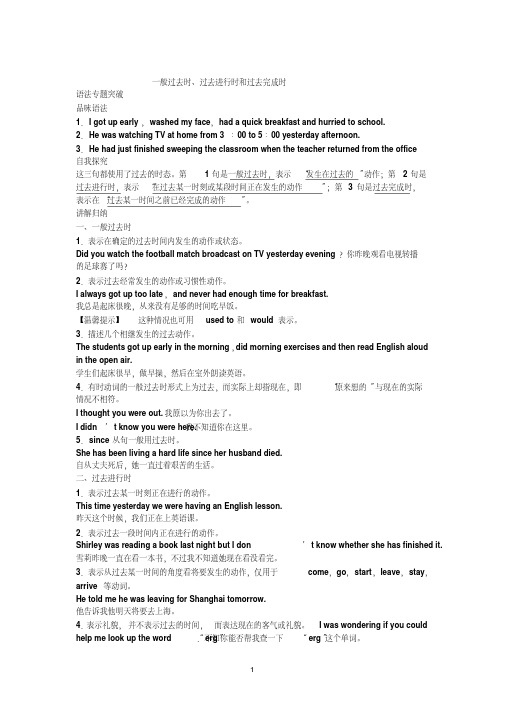
一般过去时、过去进行时和过去完成时语法专题突破品味语法1.I got up early,washed my face,had a quick breakfast and hurried to school.2.He was watching TV at home from 3∶00 to 5∶00 yesterday afternoon.3.He had just finished sweeping the classroom when the teacher returned from the office自我探究这三句都使用了过去的时态。
第1句是一般过去时,表示“发生在过去的”动作;第2句是过去进行时,表示“在过去某一时刻或某段时间正在发生的动作”;第3句是过去完成时,表示在“过去某一时间之前已经完成的动作”。
讲解归纳一、一般过去时1.表示在确定的过去时间内发生的动作或状态。
Did you watch the football match broadcast on TV yesterday evening?你昨晚观看电视转播的足球赛了吗?2.表示过去经常发生的动作或习惯性动作。
I always got up too late,and never had enough time for breakfast.我总是起床很晚,从来没有足够的时间吃早饭。
【温馨提示】这种情况也可用used to 和would 表示。
3.描述几个相继发生的过去动作。
The students got up early in the morning,did morning exercises and then read English aloudin the open air.学生们起床很早,做早操,然后在室外朗读英语。
4.有时动词的一般过去时形式上为过去,而实际上却指现在,即“原来想的”与现在的实际情况不相符。
I thought you were out.我原以为你出去了。
英语的几种时态结构表格

英语的几种时态结构表格:一般现在时、现在进行时、现在完成时、现在完成进行时、一般过去时、过去进行时、过去完成时、过去完成进行时、一般将来时、将来进行时、将来完成时、将来完成进行时、一般过去将来时、过去将来进行时、过去将来完成时、过去将来完成进行时。
1、一般现在时:①I am a student.译为:我是一个学生。
②This flower is red.译为:这个花是红色的。
③Do you like playing basketball?译为:你喜欢打篮球吗?现在进行时:①She is listening to music now.译为:她现在正在听音乐。
②The girl is singing in the playground.译为:这个女孩正在操场上唱歌。
③The bus is coming.译为:公交车来了。
2、现在完成时:①He has lived here since then.译为:他从那之后一直住在这里。
②Have you had dinner yet?译为:你已经吃过晚饭了吗?③She has drew the picture for two hours.译为:她已经画这幅画两个小时了。
3、一般过去时:①She was very busy yesterday.译为:她昨天很忙。
②He did not go to school this morning.译为:他今天早上没来学校。
③When I was young,I like singing.译为:当我年轻的时候,我喜欢唱歌。
4、过去进行时:①He was playing computer games when I was doing my homework.译为:我在做作业的时候他在玩电脑游戏。
②He was repairing his bike.译为:他正在修他的自行车。
③What were you doing at 10a.m yesterday?译为:昨天上午10点你在干什么?5、过去完成时:①I had reached the station before six o'clock yesterday.译为:昨天六点之前我已经到车站了。
- 1、下载文档前请自行甄别文档内容的完整性,平台不提供额外的编辑、内容补充、找答案等附加服务。
- 2、"仅部分预览"的文档,不可在线预览部分如存在完整性等问题,可反馈申请退款(可完整预览的文档不适用该条件!)。
- 3、如文档侵犯您的权益,请联系客服反馈,我们会尽快为您处理(人工客服工作时间:9:00-18:30)。
一般过去时1.表过去发生的事情或存在的状态eg Suddenly,the clouds cleared and the rain stopped.2.表过去经常发生的事情eg I was very thin in my childhood.3.带有确定的过去的时间状语eg Did you meet yesterday? He left just now.We often played together when we were children. 我们小时候常在一起玩。
He used to smoke a lot, but he doesn’t now. 他过去经常抽烟,但现在不抽了。
Whenever we were in trouble, he would help us. 每当我们遇到困难,他都会帮助我们。
He said he would wait until they came back.常和一般过去时连用的过去时间状语有:last night (week ,month , year , century , etc.) , yesterday , the day before yesterday , yesterday morning ( afternoon , evening ) , in 1999 , two hours ago ( one week ago , tree years ago , …)等等。
使用一般过去时,在某种意义上说就是要强调动作或状态发生或存在于过去的某个时候。
"过去"的时间概念有两层意思:一是指"现在某个时间"以前的时间;二是指"说话、写文章的那个时间点"以前的时间,注意:用于某些特殊结构中表示现在:It’s time we star ted. 我们该动身了。
I wish I knew his name. 要是我知道他的名字就好了。
I’d rather you lived closer to us. 我希望你能住得离我们近点。
【注】该用法主要用于it’s time, I wish, I’d rather, if only, as if, as though 等少数结构后接从句的情形,其中有些结构后面的句子还可用一般过去时表示将来:I’d rather you came next Monday. 我宁愿你下周星期一来。
另外表主观想法的虚拟条件句也用一般过去时表示现在:If I had the money now I’d buy a car. 假若我现在有钱,我就买辆小汽车。
过去进行时1、表示在过去某时刻正在进行的动作eg At this moment yesterday, I was packing for camp.When I came to see her last time, she was writing an article.What were you doing at eight last night ?2.用于故事的开头,交代故事发生的背景情况eg One night, he was typing in his study . Suddenly , a man broke …主要表示在过去的某个时间点上正在发生、进行的动作。
由于它的定义是表示在过去的某个时间点上正在发生、进行的动作,所以,句子常带有一个表示“过去某个时间点”的状语。
这个状语可能是短语,词组,或是一个从句。
也可能是通过上下文来表达这层意思。
3)(仅限少数动词)表示在过去的未来时间要发生的动作。
例如:She told me that she was going to Hainan for her holiday. 她告诉我她将去海南度假。
过去完成时1、发生在“过去的过去”eg When I woke up, it had stopped raining.She said she had never been to Paris.2.与一个表示过去的时间状语连用eg When the police arrived, the thieves had run away.Peter had collected more than 300 Chinese stamps by 2014.3.在过去某时之前开始一直延续到这一时间eg By the end of last year, he had worked in the factory for twenty years.By the time he was twelve, Edison had begun to make a living by himself 注意:过去完成时的判断依据[特殊用法] :过去完成时可表示过去未曾实现的想法和打算,通常连用的动词是want, think, hope, plan, mean, expect, intend, suppose 等:I had meant to come, but something happened. 我本想来,但有事就没有来。
I had intended to speak, but time did not permit. 我本想发言,但时间不允许。
We had hoped that you would come to see us, but you didn’t. 我们本想你来看我们的,但你没有来。
过去完成时与一般过去时的区别虽然这两种时态都表示过去发生的动作或存在的状态,但在使用时应注意以下几点:1. 时间状语不同:过去完成时在时间上强调"过去的过去";而一般过去时只强调过去某一特定的时间。
试比较:They had arrived at the station by ten yesterday.They arrived at the station at ten yesterday.2. 在没有明确的过去时间状语作标志时,谓语动词动作发生的时间先后须依据上下文来判断:先发生的用过去完成时,后发生的则用一般过去时。
如:She was very happy. Her whole family were pleased with her, too. She had just won the first in the composition competition.3. 当两个或两个以上接连发生的动作用and 或but 连接时,按时间顺序,只需用一般过去时来代替过去完成时;另外,在before ,after ,as soon as 引导的从句中,由于这些连词本身已经表示出时间的先后,因此也可以用过去时来代替过去完成时。
如:He entered the room, turned on the light and read an evening paper.I (had) called her before I left the office.巩固练习:一、用动词的适当形式填空。
1. We _____________ (paint) the house before we ______________ (move) in.2. That rich old man _____________ (make) a will before he _____________ (die).3. They _____________ (study) the map of the country before they ________ (leave).4. The robbers _____________ (run away ) before the policemen _______ (arrive).5. I __________ (turn off) all the lights before I ____________ (go) to bed.6. Paul __________ (go) out with Jane after he __________ (make) a phone call.7. Tom __________ (say) he ___________ (read) the book twice.8. Our plan ____________ (fail ) because we _____________ (make) a bad mistake.9. When the chairman ______________ (finish) speaking, she _____________ (leave)the hall.10.The Reads ________ (have) lunch when I ________________(get) to their house.11.When I ______________(arrive) at the station, he ____________________(leave).12..We _______________(learn) about 4000 English words by the end of last term.13.She __________ (not want) to stay in bed while the others ________________ (all, work) in the fields.14. We were surprised at what she ________already ______(do)15.She ____________(not go) to Qingdao because she ________________ (go) there before.16. He said he ______________(not tell) you the news yet.17. He said he _____________already_________(give) the book to the teacher.18. I ______________(be) to Shanghai before the World Expo.19. She told me she _________________(be) to Sanya three times.20.She _____________(play) the guitar while her sister_______________(sing).二、1.He asked me _____ during the summer holidays.A. where I had beenB. where I had goneC. where had I beenD. where had I gone2. What ____ Jane ____ by the time he was sever?A. did, doB. has, done C did, did. D. had, done3. I ______ 900 English words by the time I was ten。
